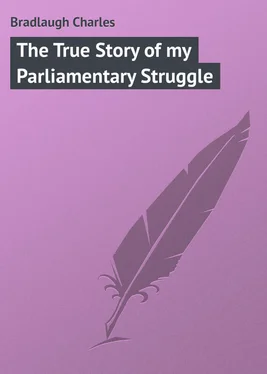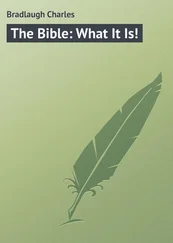Charles Bradlaugh - The True Story of my Parliamentary Struggle
Здесь есть возможность читать онлайн «Charles Bradlaugh - The True Story of my Parliamentary Struggle» — ознакомительный отрывок электронной книги совершенно бесплатно, а после прочтения отрывка купить полную версию. В некоторых случаях можно слушать аудио, скачать через торрент в формате fb2 и присутствует краткое содержание. Жанр: foreign_prose, на английском языке. Описание произведения, (предисловие) а так же отзывы посетителей доступны на портале библиотеки ЛибКат.
- Название:The True Story of my Parliamentary Struggle
- Автор:
- Жанр:
- Год:неизвестен
- ISBN:нет данных
- Рейтинг книги:3 / 5. Голосов: 1
-
Избранное:Добавить в избранное
- Отзывы:
-
Ваша оценка:
- 60
- 1
- 2
- 3
- 4
- 5
The True Story of my Parliamentary Struggle: краткое содержание, описание и аннотация
Предлагаем к чтению аннотацию, описание, краткое содержание или предисловие (зависит от того, что написал сам автор книги «The True Story of my Parliamentary Struggle»). Если вы не нашли необходимую информацию о книге — напишите в комментариях, мы постараемся отыскать её.
The True Story of my Parliamentary Struggle — читать онлайн ознакомительный отрывок
Ниже представлен текст книги, разбитый по страницам. Система сохранения места последней прочитанной страницы, позволяет с удобством читать онлайн бесплатно книгу «The True Story of my Parliamentary Struggle», без необходимости каждый раз заново искать на чём Вы остановились. Поставьте закладку, и сможете в любой момент перейти на страницу, на которой закончили чтение.
Интервал:
Закладка:
86. I think the Committee would rather hear you through. – I submit that according to law the House of Commons has neither the right nor the jurisdiction to refuse to allow the said form of oath to be administered to me, there being no legal disqualification on my part of which the House can or ought to take notice, and there being on my part an express demand to take the Oath, this demand being unaccompanied by, and free from, any reservation or limitation. I submit that there is no case in which the Oath of Allegiance has been refused to any Member respectfully and unreservedly tendering himself to be sworn. I submit that any Member properly presenting himself to be sworn, and not refusing to be sworn, is entitled to be sworn, and to take his seat without interruption, and that the discussion of any disqualification or ineligibility must in such case, according to the practice and precedent of Parliament, take place after the Member has taken his seat; and I quote in support of that John Horne Tooke’s case, which came before the House in 1801. It was alleged that John Horne Tooke was ineligible because he was an ordained clergyman of the Church of England. There he was allowed to take the oaths first, and after he had taken the oaths Earl Temple rose and said (I am quoting from page 956 of the Parliamentary History, Volume 35), that he observed a gentleman who had just retired from the table after having taken the Oaths whom he conceived to be incapable of having a seat in the House in consequence of his having taken priest’s orders, and been inducted into a living. Earl Temple agreed he would wait to see if a petition were presented against him, and if not he should move a resolution upon the subject; and ultimately a resolution was moved that John Horne Tooke was ineligible. The House allowed John Horne Tooke to sit, but declared clergymen for the future to be ineligible for sitting. I rely upon that as showing that the proper course to be pursued, supposing that any Member should think that I am ineligible, is to wait until I have been sworn and have taken my seat, and then to challenge it; and that this is clear, because if it were not so it would be possible for the first 41 Members sworn or for a majority of that 41, that is, for 21 Members to hinder the swearing of all Members coming later to the table without any remedy on the part of the Members aggrieved; and I submit, with great respect for the evidence of Sir Thomas Erskine May, that he has misapprehended the force of the Standing Order that he read to you. Hatsell’s Precedents, Volume II., page 90, declares distinctly that when a Member appears to take the oaths within a limited time, all other business is immediately to cease, and not to be resumed until he has been sworn and has subscribed the Roll; and with great submission to Sir Thomas Erskine May, there is no word in the Standing Order which he quoted as altering and changing that practice, which does so alter and change it. All that the Standing Order does is to specify the time and the manner in which the Members might come to the table to be sworn, which had not been hitherto specified; but it does not in any way deal with what was to happen when they did come to the table to be sworn. And if the Committee would permit me respectfully to submit, it would be most dangerous to the House if it were not so. The first batch of Members called over by the Clerk of the House are sworn, and they may then, if the contention raised upon the Standing Order quoted by Sir Thomas Erskine May be correct, prevent every other Member being sworn, if there be more than 40. They may fulfil all the duties of a House of Commons, and do what they please, without any remedy, as the matter stands; every election might be declared null and void, and every one sent back to their constituencies one after another. I submit also that the case of the Attorney General, Sir Francis Bacon, Volume I. of the Commons Journal, page 459, is also a precedent in the same direction. I am obliged to tell the Committee that I cannot quote it with the same reliance that I can put upon Horne Tooke’s case, for the notes seem to have been taken, I will not say irregularly, but they do not seem to convey the whole of what took place, and therefore I can only deal with the result. Sir H. Hobart is quoted as being “the only attorney that hath been in this House;” and then there arises a discussion, some of which does not seem to me to be material, as to whether the then Attorney General could sit or not, and I find in the returns that the Attorney General at that date was Sir Francis Bacon, who, three days after this discussion, elected to sit for the University of Cambridge, and although I have not the legal evidence, because the returns are incomplete for that year, as he elected to sit for the University of Cambridge, the probability is that he had also been returned for a county. There was then a Statute of the 46th Edward III., which has only recently been repealed, which made a practising man of the law absolutely ineligible; and it also appears that there was some oath of qualification, of which I have not been able to find the words, which was then taken by a Member coming to the table; and it appears here that the Oath was alleged in the course of the discussion, and two things were said which I press upon the attention of the Committee; one, that the precedents to disable a Member ought to be shown on the side of those who seek to disable (it is not written so lengthily as that; the words are, “The precedents to disable him ought to be showed on the other side”), and the other is, “Their oath, their own consciences to look unto, not we to examine it,” which meant, as I submit, that the House did not constitute itself into an Inquisition to look behind a man coming to take the Oath, but that, subject to his being dealt with by law if he had taken it improperly, or subject to a legal disqualification being made clear to the House, they assumed his oath to be properly taken. I submit that even Members absolutely petitioned against and alleged to be disqualified or ineligible by law, are always allowed to be sworn when they come to the table to be sworn and to sit pending the decision of the petition. The only cases which I have found of absolute legal disqualification in which the Member’s election was annulled before he had entered the House, are the cases of Mitchell and O’Donovan Rossa (both of whom were away), and the case of John Wilkes, who was physically incapacitated from taking the oath from the act that he was in the custody of the law at the time, and those who held him would not have permitted him to come to the table to be sworn. Those are the only cases even with an allegation of an absolute disqualification in the case of O’Donovan Rossa and Mitchell, and of a disqualification alleged, but not admitted, and not legal, not statutory, in the case of Wilkes, that I have been able to find; and in Wilkes’s case the House has solemnly decided that it did wrong there, and I submit that it ought not to do it again. But here the return is not questioned. It is not pretended that there has been a single circumstance of illegality connected with the election, the sole point being, Am I qualified to sit? If I am qualified to sit, I have the duty to take the Oath, and the House has neither the right nor the jurisdiction to refuse the Oath to me, nor to interrupt me in the taking of it. If my qualification or eligibility to sit is to be discussed, the precedent for the proper mode of discussing that qualification is in Horne Tooke’s case, and rightly so, because then I have the opportunity from my place in the House of defending myself, and of correcting any misstatements that may possibly be urged by Members who may be too anxious that I should not sit, supposing in any other House of Commons it should happen, and it then gives the Member attacked fair play. While I admit entirely that the House has a full and most complete right to expel any sitting Member, and this in its own discretion, and for any reasons in its wisdom sufficient, I submit that it has never done this without first calling upon the Member to be heard in his own defence, and that that cannot possibly happen until the Member is sworn and is sitting. I submit that while the House has the right to annul the election of a person absolutely disqualified by law, it has never, except in one case, that of John Wilkes, claimed the right to interfere, and in that case it ultimately expunged from its proceedings the whole of its hostile resolutions, as being subversive of the rights of the whole body of electors of this kingdom. I quote on that the Commons Journal, Vol. 38, 3rd of May 1782. I do not think that I should be right in troubling the Committee with the very strong arguments used time after time by Edmund Burke, Thomas Pitt, and others; but I want to point out this, that in addition to the charge on which John Wilkes was expelled from the House (and I am not questioning his original expulsion), there were also charges introduced against John Wilkes for his publications outside the House. That will be found in 1st Cavendish, page 73 and page 129, and they are charges far exceeding anything (if I may judge from the reports which have even been put in) in relation to any supposed publications of my own. None of those charges were ultimately considered by the House to justify the interference of the House with the choice of the constituency. To use the words of Mr. Thomas Pitt, on page 350 of Cavendish, words endorsed by the House itself, “Nothing but a positive law can enable you to circumscribe the electors in their choice of a representative, however, indiscreet they may be in their choice.” I consider now on what grounds is it claimed that the House of Commons has the right and jurisdiction, following the words of reference, to refuse to allow me to take and subscribe the Oath? Is it for a disqualification or ineligibility existing prior to my election and continuing down to the time of my election – I mean a disqualification or ineligibility created by Statute or existing at common law? No such disqualification is even pretended. Is it for a disqualification or ineligibility of like legal character arising since my election? No such disqualification is pretended. Is it for conduct not amounting to absolute disqualification legally, but conduct for which the House has in its discretion exercised its rights and jurisdictions by expelling a Member? It must be this, or it is nothing. If there is neither legal disqualification prior to my election, nor legal disqualification subsequent to my election, then there must be such conduct not amounting to absolute legal disqualification as would, were I a sitting Member, justify the House in using its discretion to expel a Member. But if that conduct be prior to the election, then I submit that the constituency is the sole and sovereign judge of the fitness of the candidate, such candidate not being legally disqualified, and that where the chosen and duly returned candidate is ready to perform his duties, this House has neither the right nor the jurisdiction to revoke the decision of the constituency; and that in the only case in which the House did so interfere it afterwards solemnly recorded that its conduct was illegal, as being subversive of the rights of the whole body of the electors of this kingdom. If the complaint against me is for conduct arising since my election, then I submit that even if such matters justify my expulsion as a Member, the point could only be raised after I had been heard in my place against the Resolution, and that the matter could not arise until I have taken the Oath and become entitled to speak, sit, and vote. Manifestly this must be so, as otherwise it would always be in the power of a majority to exclude from coming to take his seat any Member to whom they might have an objection; and although such a thing is, luckily, not probable now, there have been times, even in the history of the House of Commons, when a majority, even of election committees, as I read in the Records of the House, have sought by mere prejudice to exclude Members. It is, therefore, the more necessary that at any rate a Member should have the right to be heard in his own defence. I submit that there is no precedent whatever for preventing a Member from taking his seat and the Oath, on the ground of conduct not amounting to absolute legal disqualification. There is no such precedent to be found at all, and I have searched very carefully indeed. I put the question to Sir Erskine May lest anything should have escaped me, and I say absolutely there is no precedent. Then I submit that it would not be consistent with the dignity of the House to examine any statement made by any Member outside the House, as to any of its procedure, and that in fact the House has firmly refused to allow a Member to be challenged as to whether or not some of his extra-Parliamentary utterances were inconsistent with his Oath of Allegiance; and here I should like the Committee to come to a decision, because it would alter and abridge my argument. If the Committee thought (I will put a suppositious case) that, say there were some document that they thought they had the right to take into consideration here, then while I should object to that, I should like to have the opportunity of addressing the Committee as to that. So far as the evidence has gone, I have not heard of any, except the mere statement in the House, only I judged from a question put by an honorable and learned Member that something was passing in his mind (which, by the way, did not seem to me to be the fact) justifying a question put to Sir Thomas Erskine May as to whether the Oath could be administered to a man who had done something either actually or by implication repudiating the effect of that Oath. I have heard nothing in the evidence, so far as it has gone, giving the slightest color or warranty for such a question. If there are any facts to be dealt with by this Committee other than that, then I should like to know the facts, and to argue upon them; but it would be only wasting the time of the Committee to address argument to any point which the Committee would not think it right to consider; and I should be glad if, before going further into my statement, the Committee thought it right to intimate to me their view upon that.
Читать дальшеИнтервал:
Закладка:
Похожие книги на «The True Story of my Parliamentary Struggle»
Представляем Вашему вниманию похожие книги на «The True Story of my Parliamentary Struggle» списком для выбора. Мы отобрали схожую по названию и смыслу литературу в надежде предоставить читателям больше вариантов отыскать новые, интересные, ещё непрочитанные произведения.
Обсуждение, отзывы о книге «The True Story of my Parliamentary Struggle» и просто собственные мнения читателей. Оставьте ваши комментарии, напишите, что Вы думаете о произведении, его смысле или главных героях. Укажите что конкретно понравилось, а что нет, и почему Вы так считаете.












